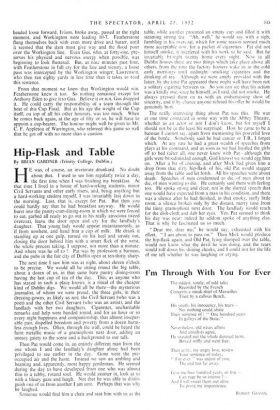Hip-Flask and Table
By BRIAN GARDNER (Trinity College, Dublin.)
HE was, of course, an inveterate drunkard. No doubt about that. I used to see him regularly twice a day, the first time when I was finishing my breakfast. At that time I lived in a house of hard-working students, minor Civil Servants and other early risers, and, being anything but a hard-working student myself, I was invariably last down in the morning. Last, that is, except for Pat. But then you could hardly say that he had breakfast anyway. He would burst into the pantry-cum-dining-room in which we were forced to eat, garbed all ready to go out in his really atrocious tweed overcoat, leave the door open and cry for the landlady's daughter. That young lady would appear instantaneously, as if from nowhere, and hand him a cup of milk. He drank it standing up at one gulp, turned on his heel and strode out, closing the door behind him with a smart flick of the wrist, the whole process taking, I suppose, not more than a minute. And where was4le off to ? Pat was by profession a barman, and the pubs in the fair city of Dublin open at ten-thirty sharp.
The next time I saw him was at night, about eleven o'clock to be precise. We would all be sitting round the big table, about a dozen of us, in that same bare pantry dining-room having the last cup of tea of the day. This, as anyone who has stayed in such a place knows, is a ritual of the cheaper kind of Dublin digs. We would all be there—the mysterious journalist, of whom we were proud; the three girls, in their dressing-gowns, as likely as not; the Civil Servant (who was a poet) and the other Civil Servant (who was an artist), and the landlady with her two daughters. Cigarettes, uncharitable remarks and help-were handed round, and for an hour or so every night happiness and companionship, that almost insepar- able pair, dispelled boredom and poverty from a dozen harm- less enough lives. Often, through the wall, could be heard the faint metallic music of a gramophone next door, adding an uneasy gaiety to the scene and a background to our talk.
Then Pat would come in, an entirely different man from the one whom I and the landlady's daughter alone had been privileged to see earlier in the day. Gone were the pre- occupied air and the haste. Instead we saw an ambling and beaming and, apparently, most happy gentleman. He seemed during the day to have developed from one who was almost thin to a tubby, rotund soul. He would saunter in, look at us with a bleary gaze and laugh. Not that he was able to distin- guish one of us from another I am sure. Perhaps that was why he laughed.
Someone would find him a chair and seat him with us at the table, while another procured an empty cup and filled it with steaming strong tea. "Ah, well," he would say with a sigh, fumbling in his overcoat, which for some reason seemed much more acceptable now, for a packet of cigarettes. Pat did not himself smoke; it interfered with his work so he said. But he invariably brought twenty home every night. Now in all Dublin houses there are two things which take place above all others, from the time the factory hooters wake us in the cold early mornings until midnight—smoking ciearettes and the drinking of tea. Although we were amply provided with the latter, by the time Pat appeared there might well have been not a solitary cigarette between us. So you can see that his action was a kindly one, since he himself, as I said, did not smoke. He always pressed them on us with an embarrassing show of . sincerity, and if by chance anyone refused his offer he would be genuinely hurt.
The really interesting thing about Pat was this. He was at one time connected in some way with the Abbey Theatre, whether as an actor or not I don't know, but for myself I should not be in the least bit surprised. How he came to be a barman I cannot say. apart from mentioning his powerful love of the bottle. Somebody said he had cancer or T.B., I forget which. At any rate he had a great wealth of speeches from plays at his command, and as soon as we had hustled the girls off to bed (after all, one never knew with Pat—although the girls were broadminded enough, God knows) we would egg him. on. After a bit of coaxing, and after Mick had given him a drop from that d:rty hip-flask of his, old Pat would stagger away from the table and let forth. All his speeches were about death. Speeches of men condemned to die, of men about to die, of men wanting to die. He certainly said them with feeling too. He spoke strong and clear, not in the slurred speech that one would have expected from a man in his condition, and there was a silence after he had finished, in that smoky, stuffy little room, a silence broken only by the distant, merry tune from the tinny gramophone next door. The landlady would reach for the dish-cloth and dab her eyes. Yes, Pat seemed to think his day was near; indeed he seldom spoke of anything else. That is why he fascinated us so much.
" Dear me, dear me," he would say, exhausted with his effort. " I am about to pass on." Then Mick would produce the hip-flask again, and Old Pat, lying slumped over the table, would not know what the devil he was doing, and the tears would roll down his shining cheeks, and I could not for the life of me tell whether he was laughing or crying.


































 Previous page
Previous page